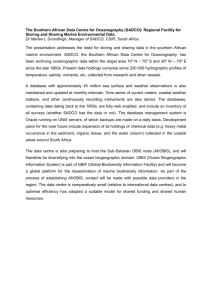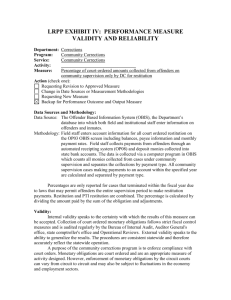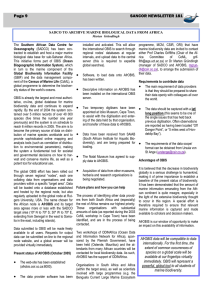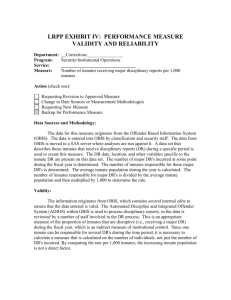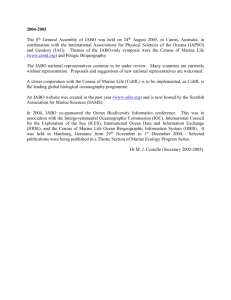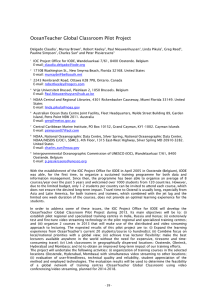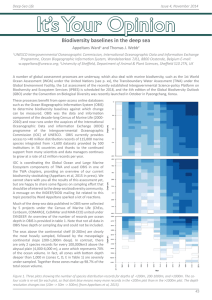Limited distribution IOC/IODE‐XX/12.1 18 February 2009
advertisement
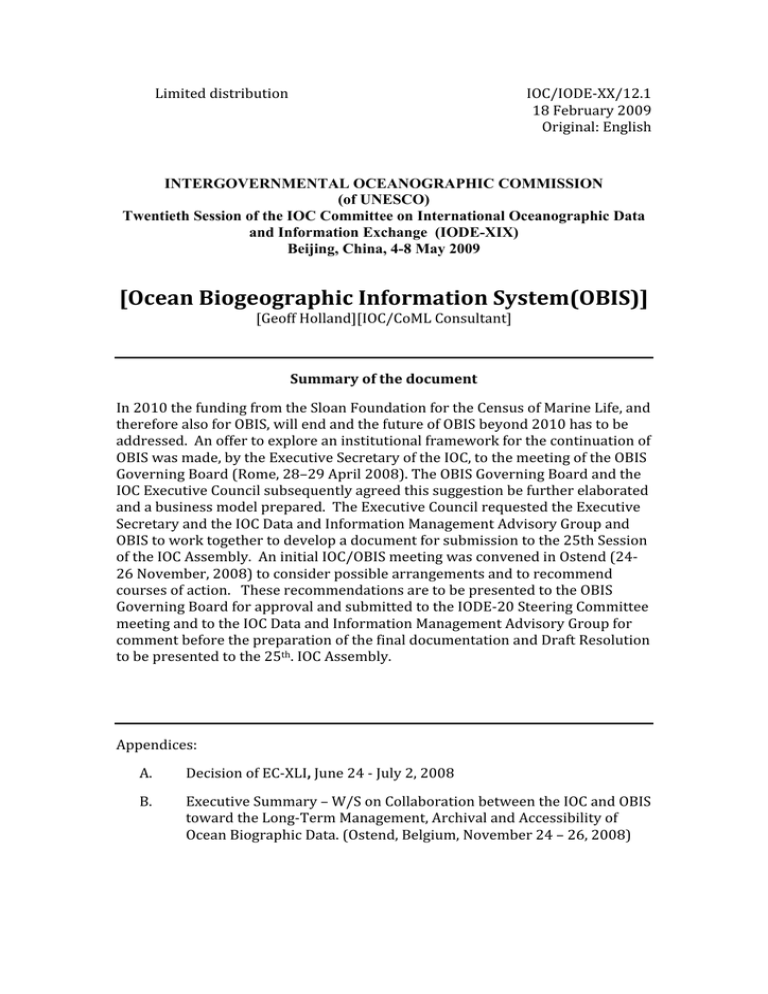
Limited distribution IOC/IODE‐XX/12.1 18 February 2009 Original: English INTERGOVERNMENTAL OCEANOGRAPHIC COMMISSION (of UNESCO) Twentieth Session of the IOC Committee on International Oceanographic Data and Information Exchange (IODE-XIX) Beijing, China, 4-8 May 2009 [Ocean Biogeographic Information System(OBIS)] [Geoff Holland][IOC/CoML Consultant] Summary of the document In 2010 the funding from the Sloan Foundation for the Census of Marine Life, and therefore also for OBIS, will end and the future of OBIS beyond 2010 has to be addressed. An offer to explore an institutional framework for the continuation of OBIS was made, by the Executive Secretary of the IOC, to the meeting of the OBIS Governing Board (Rome, 28–29 April 2008). The OBIS Governing Board and the IOC Executive Council subsequently agreed this suggestion be further elaborated and a business model prepared. The Executive Council requested the Executive Secretary and the IOC Data and Information Management Advisory Group and OBIS to work together to develop a document for submission to the 25th Session of the IOC Assembly. An initial IOC/OBIS meeting was convened in Ostend (24‐ 26 November, 2008) to consider possible arrangements and to recommend courses of action. These recommendations are to be presented to the OBIS Governing Board for approval and submitted to the IODE‐20 Steering Committee meeting and to the IOC Data and Information Management Advisory Group for comment before the preparation of the final documentation and Draft Resolution to be presented to the 25th. IOC Assembly. Appendices: A. Decision of EC‐XLI, June 24 ‐ July 2, 2008 B. Executive Summary – W/S on Collaboration between the IOC and OBIS toward the Long‐Term Management, Archival and Accessibility of Ocean Biographic Data. (Ostend, Belgium, November 24 – 26, 2008) IOC/IODE‐XX/12.1 page 2 DRAFT TEXT FOR INCLUSION IN THE SUMMARY REPORT Until recently ocean biodiversity was largely unexplored and undescribed, however, for nearly a decade, through the Census of Marine Life (CoML) (www.coml.org), scientists have been collaborating to assess the diversity of marine life throughout the world’s oceans. The Ocean Biogeographic Information System (OBIS) is the data integration component of the CoML and also open to contributions from any source. However, the future of OBIS is uncertain as its funding ends in 2010. Private funds may have provided the starting point for this venture, but governments and the public will be the recipients of the resulting benefits and need to ensure that the effort continues. In this context an offer was made, by the Executive Secretary of the Intergovernmental Oceanographic Commission (IOC) of UNESCO to the meeting of the OBIS Governing Board (Rome, 28–29 April 2008), to explore an institutional governmental framework for the continuation of OBIS. The IOC has recognised the vacuum in dealing with biological ocean data and the IODE has recently initiated several steps to address the issue. The IOC (EC­XLI, June 24 ­ July 2, 2008) considered OBIS a highly attractive future component or partner of IODE and accepted the wish of the OBIS Governing Board to investigate different scenarios for a closer affiliation between IOC and OBIS, including the adoption of OBIS by the Commission (see Annex A). They agreed to develop a document and draft resolution for submission to the 25th Session of the IOC Assembly in 2009. The documentation should, for different scenarios, investigate consequences for both IOC and OBIS, and should contain estimates of budgetary implications, and involve consultations, as appropriate, with potential donors and/or host organizations. An initial meeting between IOC and OBIS experts was held at the IODE Programme Office in Ostend Belgium, November 24 ­26, 2008 and several possible scenarios were discussed. The Statutes of the IOC and its accepted data management policy were found to be consistent with the policies and objectives of OBIS. The arrangements considered for OBIS and the IOC were a formal agreement of cooperation and financial assistance between the two organizations; the adoption of OBIS as an element of the IODE, and the adoption of OBIS as an IOC programme. The meeting considered that a mere cooperative agreement would not guarantee the desired sustainability for OBIS and this option was not pursued. The meeting considered the adoption of OBIS as a part of IODE or as a separate IOC/OBIS program were both valid options. The conclusion of the meeting was that OBIS should aim to become an IOC programme together with the establishment of a joint IODE/OBIS GE. An individual OBIS programme was considered better able to retain the ability to interact with related international partners on behalf of the IOC and UNESCO and to maintain the impetus and visibility that has been won in this undeveloped area. The Executive Summary Report of the Ostend meeting is available as Annex B. Subsequent considerations recognized that the two remaining options were not necessarily exclusive and that the initial adoption of the OBIS as part of the IODE network may facilitate the initial transfer of OBIS into the intergovernmental community without prejudice to its final status as an independent program. Discussions are continuing with the present host institution towards obtaining a formal proposal to host an OBIS decentralized Office, which will be required for either a Programme or Project Office. A Business Plan is being prepared and documentation will be tabled for comment to the IOC Data and Information Management Advisory Group and IODE ­20 for comment and also submitted to the OBIS Governing Board for consideration and approval. The final documentation and Draft Resolution will be prepared for the IOC Assembly in June 2009. IOC/IODE‐XX/12.1 page 3 DRAFT ITEMS FOR THE 2009­2011 WORK PLAN AND BUDGET IODE is requested to provide comments on the above. In view of the two possible OBIS scenarios, IODE­20 should consider and advise on:­ i.) Possible Changes to its own IODE Terms of Reference to accommodate either a separate OBIS Programme or an OBIS project within IODE. ii.) Possible changes to the operation and management of GE­BICH. iii.) Possible implications of the Terms of Reference for a new IOC/OBIS Intergovernmental Panel iv.) Terms of Reference and mandate for a possible future Joint IODE/OBIS GE v.) Any financial implications and provision required arising from the two options IOC/IODE‐XX/12.1 page 4 Annex A The Executive Council recognized the importance and value of CoML, the particular value of the OBIS component as a global repository for marine biological data, and the potential of a second phase of OBIS to expand data in this vital repository and to improve the interface for global access and exchange of marine biological data. The Executive Council considered OBIS a highly attractive future component or partner of IODE, and welcomed the wish of the OBIS Governing Board to investigate different scenarios for a close affiliation between IOC and OBIS, or the adoption of OBIS by the IOC. It requested the Executive Secretary and the IOC Data and Information Management Advisory Group to work together with the OBIS Secretariat to develop a document for submission to the 25th Session of the IOC Assembly in 2009. The Executive Council considered that the document should describe possible scenarios for collaboration between IOC and OBIS, concentrating on the possibility of the creation of an IOC‐OBIS Programme and an IOC–OBIS Programme Office. It should, for different scenarios, investigate consequences for both IOC and OBIS, and should contain estimates of budgetary implications, and involve consultations, as appropriate, with potential donors and/or host organizations. IOC/IODE‐XX/12.1 page 5 Annex B Workshop on Collaboration between the IOC and OBIS Toward the Long­ Term Management, Archival and Accessibility of Ocean Biographic Data. Ostend, Belgium, November 24 – 26, 2008 Executive Summary In 2010 the present funding from the Sloan Foundation for the Census of Marine Life, and therefore also for OBIS, will end and the future of OBIS beyond 2010 has to be addressed. An offer to explore an institutional framework for the continuation of OBIS was made, by the Executive Secretary of the IOC, to the meeting of the OBIS Governing Board (Rome, 28–29 April 2008). The OBIS Governing Board welcomed the offer, but recommended that this suggestion be further elaborated and a business model prepared. Subsequently, IOC Member States received a presentation on the subject at the IOC Executive Council (EC‐XLI, June 24 ‐ July 2, 2008). The EC considered OBIS a highly attractive future component or partner of IODE and, in particular, the value of OBIS as a global repository for marine biological data. The EC accepted the wish of the OBIS Governing Board to investigate different scenarios for a closer affiliation between IOC and OBIS, including the adoption of OBIS by the Commission. The Executive Council requested the Executive Secretary and the IOC Data and Information Management Advisory Group (DIMAG) to work together with the OBIS Secretariat to develop a document for submission to the 25th Session of the IOC Assembly in 2009. The Executive Council considered that such a document should describe possible scenarios for collaboration between IOC and OBIS, concentrating on the possibility of the creation of an IOC‐OBIS programme and an IOC–OBIS Programme Office. It should, for different scenarios, investigate consequences for both IOC and OBIS, and should contain estimates of budgetary implications, and involve consultations, as appropriate, with potential donors and/or host organizations. The present meeting and conclusions represent an important initial step in the discussions between the two organizations. The IOC Secretary for the IODE gave a detailed presentation of the IOC and the IODE. He explained that the IOC had four high level objectives namely: the prevention and reduction of the impacts of natural hazards; the mitigation of the impacts and adaptation to climate change and variability; safeguarding the health of ocean ecosystems, and management procedures and policies leading to the sustainability of coastal and ocean environment and resources. These objectives are carried out under the four major programmes of Ocean Science, Ocean Observations and Services, the Tsunami Coordination Unit and Capacity Development. Although administered under the Ocean Observation and Services Section, the IODE data management programme is a cross‐ cutting element that interacts with all of the Commission’s activities and is the ocean data arm of the IOC. Mr. Pissierssens highlighted the adoption, by the twenty‐fourth Session of the IOC Assembly (2007), of the “IOC Strategic Plan for Oceanographic Data and Information Management (2008‐2011)”. A Strategy that will provide “A comprehensive and integrated ocean data and information system, serving the broad and diverse needs of IOC IOC/IODE‐XX/12.1 page 6 Member States, for both routine and scientific use.” Of particular interest to the present meeting was the recent work by the IODE on chemical and biological data to complement the more established physical ocean data sets. The Executive Director of OBIS stated that the mission of OBIS was to make available, online, primary data on marine species and to support the CoML synthesis in 2010. The OBIS network is comprised of 15 Regional OBIS Nodes (RONs) that together ensure a true global coverage for OBIS. These regional nodes provide closer access to the data providers and mobilize regional data. Data are quality controlled and all data and tools are freely available and accessible online. The number of records downloaded from the databases has grown from under 20,000 per day in 2006 to more than 100,000 per day at present levels; the number of hits on the web site is now well over a million per month. The presentation also emphasized the present limitations in marine biographical data, noting that only a small fraction of the ocean biodiversity is known. Nevertheless the numbers of known species is growing rapidly and the OBIS contribution is significant. The present OBIS activities continue to be the development of IT infrastructure, seeking out new and historical data, improving quality control and analysis tools. He went on to explain the organizational structure of OBIS and how it was presently managed and administered, in particular he stressed the uncertainty surrounding the present operation and the need to find a more permanent solution to ensure the momentum achieved and a sustainable future. The Workshop participants examined the constitution of the two organizations and found no fundamental reason to prohibit a future closer arrangement between the two. The Statutes of the IOC and its accepted data management policy were consistent with the policies and objectives of OBIS. In addition the meeting was of a unanimous and strong opinion that a closer union between the two would be mutually beneficial. The management and protection of the marine environment and its living resources is dependent upon wise and learned decision‐making capability. Whether those decisions relate to climate prediction, the mitigation of natural disasters, fisheries management, weather forecasting, ecological protection, pollution prevention, biodiversity or coastal area management, they all require accurate and timely knowledge and information to be successful. The Workshop agreed that a merging of the OBIS system into the IOC family, as a part of the ocean data network that already exists and that has been successfully dealing with data management and exchange for nearly fifty years, represented a wonderful opportunity that should not be lost. The direction given by the Executive Council was to investigate possible scenarios for an OBIS Programme and Programme Office within the IOC. The Workshop participants agreed that the direction given by the respective governing bodies would allow the consideration of either an IOC/IODE programme activity or an independent IOC/OBIS programme. There was also the possibility of amending the present informal cooperation between the two organizations into a more formal partnership. It was therefore agreed that, of the options available, the following three were the most valid and that the subsequent discussion should concentrate on these: (i.) an enhanced partnership arrangement between OBIS and the IOC; (ii.) the adoption of OBIS as an IODE program activity and (iii.) the adoption of OBIS as a new program of the Commission. The partnership option (i.) is of course very flexible and could cover a wide variety of topics. For example, agreement on the use and maintenance of common standards and formats, free exchange and access amongst IODE and OBIS data centres, joint meetings and cooperation amongst experts, mutual training programs, etc. Under this arrangement the administration and operation of the two organizations would remain IOC/IODE‐XX/12.1 page 7 separate and cooperation would take place under a cooperative agreement. Even as a data centre outside the IOC, there remained the potential for OBIS to become an NODC specialized centre for biological data and the possibility to apply for wider recognition as a world data centre of ICSU. An agreement could also include an undertaking from the IOC and its Member States to assist in the identification and negotiation of funding sources for the OBIS network. However this option did not fully address the fundamental requirement of creating a continuing and stable future for OBIS. It would also lose the opportunity of embracing OBIS within the IOC programme with obvious benefits to both organizations. OBIS and the IODE operate in a similar fashion and therefore option (ii.), to fold OBIS into the IOC as part of the IODE structure, presented a very valid opportunity. In such a scenario the Regional OBIS Network (RON) would be merged with the IODE network of National Ocean Data Centres (NODCs). Many of the respective national and regional centres already have organizational connections; however, difficulties for OBIS may arise in the individual transfer of some RONs from their present affiliation to a national or governmental status. Where applicable, RON managers could be added as members of the IODE Committee and the technical/scientific committee of OBIS could become an IODE Group of Experts. There may be some opportunities to consolidate the present IODE programmes with the new OBIS initiative. The OBIS Executive Director would become an IOC Programme Specialist and a Programme Office could remain with a supporting host organization in a Member State or be moved to the IODE programme office. Member States of the IOC would govern the oversight of the OBIS operation. Recommendations, developed with the guidance of the OBIS technical/scientific experts would be brought to the IOC Assembly and Executive Council through the IODE Committee. OBIS would be a welcome addition to the IODE and would address a notably weak part of its mandate. The addition of OBIS to the data management activities of IODE would add an important and enthusiastic new community to the IODE family. It would have the advantage of being already an operational program with a global coverage through its regional network and status. For OBIS, many of the data management requirements for quality control, exchange, archival, metadata, discovery, format, standards, interoperability etc., would be compatible with tasks in IODE and OBIS would benefit from the close association. The merging of OBIS into the intergovernmental structure of the IODE would provide stability with international and national recognition. There would be national and regional advantages achieved through the combination of institutional arrangements between the networks. There was however, concern over the diminished identity and visibility for OBIS and its ability to maintain its linkages with its external partners, a concern that must be addressed and respected by the IOC. The OBIS Board will also need to be satisfied that an OBIS programme within the IOC/IODE would protect the stated objectives of OBIS and that the momentum achieved within the biological community would be sustained. For the IOC the main issue will be a resource question. Such an important programme will necessitate the allocation of permanent personnel positions, at least for the programme head, and direct and in‐kind financial resources will be needed to support the new Group of Experts or Steering Group. The final option (iii.) would see OBIS adopted as a separate programme of the IOC. As primarily a data programme, it would be housed in the Ocean Observation and Services Section and report to the IOC governing bodies through an intergovernmental Committee that would need to be established. This intergovernmental Committee would be able to establish Task Teams and Groups of Experts, subject to the availability of funds and approval of the IOC Member States. The resources and staffing of the IOC/IODE‐XX/12.1 page 8 Programme Office would be the same as in option (ii.) as would the requirement to resolve the situation of finding a host. Many of the advantages expressed under option (ii.) would remain. The IOC would benefit from the addition of an important program that fitted closely to its stated High Level Objectives and would strengthen its biological ocean mandate. However under this option OBIS would have increased visibility and stature. OBIS and IODE would need to address their shared data responsibilities to avoid unnecessary duplication. OBIS would be in an improved position to undertake science objectives associated with its users and the ocean biodiversity community. It would retain its networks and affiliations, but again OBIS and the IODE would need to cooperate closely to ensure that any issues arising between their respective regional and national networks were quickly resolved. Under option (iii.), OBIS would operate from a stable intergovernmental base and assist in establishing links with other biologically related programs within the IOC and expand such links into external communities. There may be longer‐term possibilities to strengthen ties with FAO and living resource requirements, especially in the realm of climate change. There will be additional synergies with UNESCO programs. Workshop participants discussed difficulties that may arise from the separation of IODE and OBIS within the IOC in terms of unnecessary duplication and competition for the scarce ocean data related funds available. These concerns would be diminished by creating a Joint IODE/OBIS Group of Experts on Ocean Biodiversity Data to ensure maximum complementarity and inter‐operability between the two data systems and in compliance with the IOC Data Management Strategy. There would be the added advantage of using this group to accommodate the interests of other IOC programs and possibly exterior interests at a later date. The discussion on the advantages and disadvantages of the three options rejected options (i.) and (ii.) and concluded that option (iii.), together with the establishment of a Joint IODE/OBIS Group of Experts, was the preferred solution. This option should be further explored and developed before being presented to the OBIS Governing Board and the Assembly for decision. Financial and staffing matters remain to be addressed including the funding implications within the IOC and at the host institution. The need for additional interim support from existing and other possible extra‐budgetary sources of funding remains a serious question. A business plan will need to be prepared. IOC and OBIS will need to use their combined efforts to attract extra‐budgetary monies. Terms of Reference must be drafted for an IOC/ OBIS Committee and the Joint IODE/OBIS GE. The OBIS Executive Director agreed to provide an OBIS work plan to assist with these tasks. The Workshop noted other implications of the proposed arrangement, would need to be examined before the final documents were brought forward for approval. The Workshop prepared a list and an intended schedule for the actions needed to bring decision documents to the attention of the Governing Board of OBIS and to the IOC Assembly for consideration and approval. [end of document]
